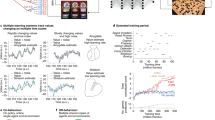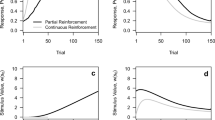Abstract
The problem considered in this paper is how the classification of observed behaviour of organisms can be used to influence adaptive learning, beneficially. The solution to this problem hearkens back to the pioneering work during the 1980s by Zdzisław Pawlak and others on classification of objects and approximation spaces, where elementary sets of equivalent objects a framework for perceptions concerning observed behaviours. The seminal work by Oliver Selfridge and Chris J.C.H. Watkins on delay rewards and adaptive learning, also during the 1980s, combined with more recent work on reinforcement learning provide a basis for the forms of adaptive learning introduced in this article. In addition, recent work on approximation spaces has led to what is known as approximate adaptive learning. This article presents two forms of run-and-twiddle (RT) adaptive learning, each using the Watkins’ stopping time strategy to mark the end of an episode. Twiddling amounts to adjusting what one does to achieve a better result. This becomes more apparent in approximate RT adaptive learning introduced in this article, where a record of observed behaviour patterns during each episode recorded in an ethogram makes it possible to define a pattern-based learning rate in the context of approximation spaces. Both forms of adaptive learning are actor-critic methods. The contribution of this article is the introduction of two forms of adaptive learning with Watkins’ stopping time strategy with differential discount on returns in both cases and differential learning rate for adaptive learning in the context of approximation spaces.
Preview
Unable to display preview. Download preview PDF.
Similar content being viewed by others
References
Audi, R. (ed.): The Cambridge Dictionary of Philosophy, 2nd edn. Cambridge University Press, Cambridge (1999)
Berenji, H.R.: A convergent actor–critic-based FRL algorithm with application to power management of wireless transmitters. IEEE Trans. on Fuzzy Systems 11/4, 478–485 (2003)
Doob, J.L.: Stochastic Processes. Chapman & Hall, London (1953)
Gomolińska, A.: Approximation spaces based on similarity and dissimilarity. In: Lindemann, G., Schlingloff, H., Burkhard, H.-D., Czaja, L., Penczek, W., Salwicki, A., Skowron, A., Suraj, Z. (eds.) CS&P’06. Concurrency, Specification and Programming. Infomatik-Berichte, vol. (206), pp. 446–457 (2006)
Geramifard, A., Bowling, M., Sutton, R.S.: Incremental least-squares temporal difference learning. In: AAA06. Proc. 21st National Conf. on AI, pp. 356–361 (2006)
Henry, C., Peters, J.F.: Image Pattern Recognition Using Approximation Spaces and Near Sets. In: JRS07. Proc. 2007 Joint Rough Set Symposium, Toronto, Canada (May 14-16, 2007)
Hammersley, J.M., Handscomb, D.C.: Monte Carlo Methods. Methuen & Co Ltd, London (1964)
Mitzenmacher, M., Upfal, E.: Probability and Computing. Randomized Algorithms and Probabilistic Analysis. Cambridge University Press, Cambridge (2005)
Orłowska, E.: Semantics of Vague Concepts, Applications of Rough Sets, Institute for Computer Science, Polish Academy of Sciences, Report 469 (March 1982)
The Oxford English Dictionary. Oxford University Press, London (1933).
Pal, S.K., Polkowski, L., Skowron, A. (eds.): Rough-Neural Computing: Techniques for Computing with Words. Cognitive Technologies. Springer, Heidelberg (2004)
Pavel, M.: Fundamentals of Pattern Recognition, 2nd edn. Marcel Dekker, New York (1993)
Pawlak, Z.: Classification of Objects by Means of Attributes, Institute for Computer Science, Polish Academy of Sciences, Report 429 (March 1981)
Pawlak, Z.: Rough Sets, Institute for Computer Science, Polish Academy of Sciences, Report 431 (March 1981)
Pawlak, Z.: Rough sets. International J. Comp. Inform. Science 11, 341–356 (1982)
Pawlak, Z., Skowron, A.: Rudiments of rough sets. Information Sciences 177(1), 3–27 (2007)
Peters, J.F.: Near sets. Special theory about nearness of objects. Fundamenta Informaticae 75(1-4), 407–433 (2007)
Peters, J.F.: Near Sets. Toward Approximation Space-Based Object Recognition. In: JRS07. Proc. 2007 Joint Rough Set Symposium, Toronto, Canada (May 14-16, 2007)
Peters, J.F., Borkowski, M., Henry, C., Lockery, D., Gunderson, D., Ramanna, S.: Line-Crawling Bots That Inspect Electric Power Transmission Line Equipment. In: ICARA 2006. Proc. 3rd Int. Conf. on Autonomous Robots and Agents, Palmerston North, NZ, pp. 39–44 (2006)
Peters, J.F., Skowron, A., Stepaniuk, J.: Nearness in approximation spaces. Lindemann, G., Schlilngloff, H., et al. (eds.) CS&P’2006. Proc. Concurrency, Specification & Programming. Informatik-Berichte Nr. 206, Humboldt-Universität zu Berlin, pp. 434–445 (2006)
Peters, J.F., Skowron, A., Stepaniuk, J.: Nearness of objects: Extension of approximation space model. Fundamenta Informaticae 77 (in press, 2007)
Peters, J.F.: Classification of objects by means of features. In: Kacprzyk, J., Skowron, A. (eds.) FOCI07. Proc. Special Session on Rough Sets, IEEE Symposium on Foundations of Computational Intelligence, IEEE Computer Society Press, Los Alamitos (2007)
Peters, J.F., Henry, C.: Approximation spaces in off-policy Monte Carlo learning. In: Engineering Applications of Artificial Intelligence (in press, 2007)
Peters, J.F.: Rough ethology: Toward a Biologically-Inspired Study of Collective behaviour in Intelligent Systems with Approximation Spaces. In: Peters, J.F., Skowron, A. (eds.) Transactions on Rough Sets III. LNCS, vol. 3400, pp. 153–174. Springer, Heidelberg (2005)
Peters, J.F., Henry, C.: Reinforcement learning with approximation spaces. Fundamenta Informaticae 71(2-3), 323–349 (2006)
Peters, J.F., Henry, C., Ramanna, S.: Rough Ethograms: Study of Intelligent System behaviour. In: Kłopotek, M.A., Wierzchoń, S., Trojanowski, K. (eds.): New Trends in Intelligent Information Processing and Web Mining (IIS05), Gdańsk, Poland, June 13-16, 2005, pp. 117–126 (2005)
Polkowski, L.: Rough Sets. Mathematical Foundations. Springer, Heidelberg (2002)
Polkowski, L., Skowron, A. (eds.): Rough Sets in Knowledge Discovery 2. Studies in Fuzziness and Soft Computing, vol. 19. Springer, Heidelberg (1998)
Precup, D., Sutton, R.S., Paduraru, C., Koop, A., Singh, S.: Off-policy with recognizers. Advances in Neural Information Processing Systems, pp. 1–8 (2006)
Rubinstein, R.Y.: Simulation and the Monte Carlo Method. John Wiley & Sons, Toronto (1981)
Selfridge, O.G.: Some themes and primitives in ill-defined systems. In: Selfridge, O.G., Rissland, E.L., Arbib, M.A. (eds.) Adaptive Control of Ill-Defined Systems, Plenum Press, London (1984)
Skowron, A., Stepaniuk, J.: Generalized approximation spaces. In: Lin, T.Y., Wildberger, A.M. (eds.) Soft Computing, Simulation Councils, San Diego, pp. 18–21 (1995)
Skowron, A., Swiniarski, R., Synak, P.: Approximation spaces and information granulation. In: Peters, J.F., Skowron, A. (eds.) Transactions on Rough Sets III. LNCS, vol. 3400, pp. 175–189. Springer, Heidelberg (2005)
Skowron, A., Stepaniuk, J., Peters, J.F., Swiniarski, R.: Calculi of approximation spaces. Fundamenta Informaticae 72(1-3), 363–378 (2006)
Skowron, A., Stepaniuk, J.: Tolerance approximation spaces. Fundamenta Informaticae 27(2-3), 245–253 (1996)
Skowron, A., Stepaniuk, J.: Information granules and rough-neural computing. In: Pal et al. [11] (2204), pp. 43–84
Stepaniuk, J.: Approximation spaces, reducts and representatives. In [28], pp. 109–126
Sutton, R.S., Barto, A.G.: Reinforcement Learning: An Introduction. The MIT Press, Cambridge, MA (1998)
Wolski, M.: Similarity as nearness: Information quanta, approximation spaces and nearness structures. In: Proc. CS&P 2006. Infomatik-Berichte, pp. 424–433 (2006)
Watkins, C.J.C.H.: Learning from Delayed Rewards. Ph.D. Thesis, supervisor: Richard Young. King’s College, Cambridge University (May 1989)
Watkins, C.J.C.H., Dayan, P.: Reinforcement learning. Encyclopedia of Cognitive Science. Macmillan, UK (2003).
Wawrzyński, P.: Intensive Reinforcement Learning, Ph.D. dissertation, supervisor: Andrzej Pacut, Institute of Control and Computational Engineering, Warsaw University of Technology (May 2005)
Whitehead, A.N.: Process and Reality. Macmillan, UK (1929)
Williams, D.: Probability with Martingales. Cambridge University Press, Cambridge (1991)
Author information
Authors and Affiliations
Editor information
Rights and permissions
Copyright information
© 2007 Springer-Verlag Berlin Heidelberg
About this paper
Cite this paper
Peters, J.F. (2007). Toward Approximate Adaptive Learning. In: Kryszkiewicz, M., Peters, J.F., Rybinski, H., Skowron, A. (eds) Rough Sets and Intelligent Systems Paradigms. RSEISP 2007. Lecture Notes in Computer Science(), vol 4585. Springer, Berlin, Heidelberg. https://doi.org/10.1007/978-3-540-73451-2_8
Download citation
DOI: https://doi.org/10.1007/978-3-540-73451-2_8
Publisher Name: Springer, Berlin, Heidelberg
Print ISBN: 978-3-540-73450-5
Online ISBN: 978-3-540-73451-2
eBook Packages: Computer ScienceComputer Science (R0)




